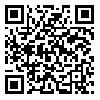BibTeX | RIS | EndNote | Medlars | ProCite | Reference Manager | RefWorks
Send citation to:
URL: http://rjms.iums.ac.ir/article-1-3880-en.html
Background: One of the treatments in patients with dangerous
diseases particularly heart failure, is Implantable Cardioverter Defibrillator
(ICD) that is used to prevent sudden cardiac death. Regarding to the
superiority of ICD rather than medical treatment, the purpose of this study is
the assessment of time-dependent effective factors on the rates of entered
shocks to patients with ICD.
Methods: In this paper, we studied heart patients in Ghaem
Hospital of Mashhad from 2005 to the first half of 2008. For various clinical
reasons, ICD has been improvised for these patients. The QRS duration was
measured by a digital caliper with an accuracy of a thousandth of a millimeter
before we implanted ICD. Moreover, age of patients and type of ICD for each
patient were recorded. Finally, we analyzed data set by a survival
semiparametric statistical model through R statistical software.
Results: For these patients, all mentioned variables had
time-varying effects. Age, had an additive effect on the entered shocks by this
device in all patients over time. Type of ICD has both an additive effect in
the period of time and depressive effect in another period. Also QRS influences
the shocks induced by ICD with gentle slope.
Conclusion: For a specified patient, based on three explanatory variables,
the introduced model could be used in reinforcement of correct diagnosis in
installation of ICD. The single chamber type of ICD, entered less inappropriate
shocks to the heart of patients than the two
other types of ICD i.e CRTD and two chamber.



